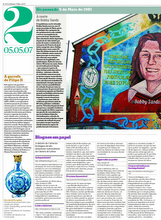'I smoke for my mental health'
'I smoke for my mental health'
Following our G2 special on the smoking ban, artist David Hockney offers a personal view on why he will always be devoted to cigarettes
Tuesday May 15, 2007
The Guardian
On July 1 2007, the most grotesque piece of social engineering will begin in England: the ban on smoking in enclosed public spaces, imposed easily by a political and media elite. They think it will lead to healthier people and a cleaner atmosphere. They believe they can change people easily. The science of marketing has been absorbed by them and they think they can control everybody. I don't think they can. People will stay at home and do drugs instead - legal and illegal.
I have lived in California for a number of years. They started smoking bans, but they didn't affect smokers that much. In California you move around in your own private space. If one goes to a public space, say the opera or Disney Hall, then because the climate is ideal the smoker can just step outside, at all times of the year. Many restaurants have gardens and the bans have never really bothered me. But something else has happened in California since the bans came in, unreported by the media, and it took me a while to notice because I have spent the past seven years working in England.
The amount of drugs advertised on television tells me what has replaced tobacco (although 20% still smoke): painkillers, Prozac and antidepressants, mostly prescription drugs - you just tell the doctor what you need. When prescription drugs are advertised in the press there is always a lot of small print listing side effects, and on television you get a speedy talking voice listing the side effects. You perhaps hear one word in four - paralysis, diarrhoea, death, headaches. I expect it all to come here. Drugs (legal and illegal) are the world's largest business, and one can understand why, since they make us feel better.
I know about fanatical anti-smokers - my father was one of the first (although his eldest son has outlived him and smoked until he was 70, and I'm still smoking at almost 70 - indeed, my birthday is nine days after the ban). I smoke for my mental health. I think it's good for it, and I certainly prefer its calming effects to the pharmaceutical ones (side effects unknown).
Well, you say, smoking has dreadful side effects. Certainly on some people, but not on all. So we should ask the British Medical Association to explain Denis Thatcher smoking Senior Service (unfiltered) and dying at 88, or Kurt Vonnegut living till 84 after smoking Pall Mall cigarettes for 70 years. What is the explanation? Nobody seems to ask and no one gives any explanation.
In the late 90s the ex-mighty New York Times was very anti-tobacco. I kept writing letters to them. None was published. When Deng Xiaoping, the Chinese leader, died at the age of 92, there was an obituary in the New York Times. Three days later there was the most foolish letter which said that Mr Deng was a very bad example to the young because he always had a Panda cigarette in his hand or mouth.
I was appalled that they had printed this, and wrote to them suggesting Mr Deng had lived a very long life - how long do you expect people to live? - and the logic of his argument would be that Adolf Hitler was a very good example for the young as he didn't smoke. It wasn't published, and I began to realise the New York Times was no longer a serious newspaper. After that I was sceptical about everything I read in newspapers.
Meanwhile in England, the press, without tobacco advertising, sided with the anti-smokers. The BBC made itself "smoke-free" and I realised how sinister this was. The BBC's problem, which won't go away, is that there is no neutral viewpoint. Heisenberg's uncertainty principle is part of the basis of the mathematics that led to the computer, but it also stated that the observer affects the observed - no one is neutral. The BBC used to claim that it was neutral, but now it is part of a massive social engineering project paid for by its listeners and viewers. It is against a group of 12 million people who choose to smoke - not very fair.
The British press might be quite lively, but it is also pathetically childish. I take little in it seriously, and when I am in Bridlington I only glance at newspapers. They are not sceptical enough, which is why I see them now as part of the social engineering. No one asks what the consequences will be - all will be good, they childishly think.
The Guardian says that the ban has been a "success" in Scotland. What do they mean by "success"? Pub takings have gone down, some pubs have closed. But surely the ban would only have been a "success" if the non-smokers had been flocking to the pubs. They have not.
What do I think? You're living in a madhouse, David ... Actually, I've always thought that, but I have a love for the surface of the Earth that is an escape from the mean-spirited and dreary people who seem to have taken over England.
The ban won't affect me much. I live very privately. I'm not very social - I'm too deaf, and in the world I have created I will smoke. I've no wish to meet politicians - most of them have the most odious ideas about people. England is full of big pushers of the coming pill society, and we've lost a sense of messiness - no longer any Delight in Disorder here (a careless shoestring in whose tie/ I see a wild civility/Do more bewitch me than when art/is too precise in every part, Robert Herrick).
Two months ago I started the largest painting I've ever done: 15ft x 40ft. The moment I began I found myself running up the stairs (with a fag) and realised some people are more in tune with a life force than others.
I can't be the only voice like this. In England people should speak up more, defend themselves, but it's hard against all the forces at work. Two million anti-smoking signs are going up on July 1, including inside Westminster Abbey. The uglification of England is under way by people with no vision. I detest it.




Sem comentários:
Enviar um comentário